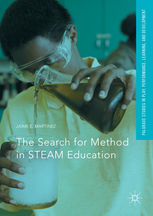Education
From STEM to STEAM to Developmental Learning
Our future scientists and engineers need to play.
Posted August 3, 2017
Returning to my office this morning after a ten-day writing holiday, I found a delightful package waiting for me—several complementary copies of the new book, The Search for Method in STEAM Education by Jaime (Jim) E. Martinez. Dr. Martinez is a pioneer in bringing playful and performatory learning to higher education and to service learning. He is an associate professor in the Interdisciplinary Studies Program at New York Institute of Technology in New York City. His research interests include experiential learning and performatory approaches to human learning and development. Before earning his Ph.D. in Urban Education at The Graduate Center, The City University of New York (CUNY), his professional activities included teaching in public schools, a partnership in an entrepreneurial startup company. and sixteen years as an information technology professional.

The Search for Method in STEAM Education offers an important direction for STEM (Science, Technology, Engineering, Math) to take in order for it to be successful and of benefit to students and our society. The first step is adding the arts (an “A”) to STEM, making it STEAM education.
One of STEAM’s origins as an educational movement is the Rhode Island School of Design. According to the website STEM to STEAM, “In this climate of economic uncertainty, America is once again turning to innovation as the way to ensure a prosperous future. Yet innovation remains tightly coupled with Science, Technology, Engineering and Math – the STEM subjects. Art + Design are poised to transform our economy in the 21st century just as science and technology did in the last century. We need to add Art + Design to the equation — to transform STEM into STEAM."
Dr. Martinez and others take another step. They do not add the arts—as a subject—to STEM. Rather, they transform the way teaching and learning are done. They do not focus on the products of learning (information and skills) alone, but equally on the environments people need in order to learn and the process of creating them. Classroom and seminars are collaborative, not hierarchical. Students create learning ensembles for the “performance” of scientific discovery and playful invention. New York City, including its poorest communities, is the learning community. Students not only learn, they develop emotionally, socially, culturally and intellectually.
The roots of Dr. Martinez‘ practice spread wider than STEM or STEAM education and have implications even beyond schools. He begins to share these roots in his introduction to The Search for Method in STEAM Education:
This book is about creating new kinds of developmental interdisciplinary learning environments that will be necessary if STEAM (Science, Technology, Engineering, Art, Math) education reforms are going to amount to more than just another educational fad. The title is a “shout out” to Lev Vygotsky, a developmental psychologist whose ideas I will be referencing throughout the book. Vygotsky contributed important and transformative theories of learning to the education research field and used the phrase “search for method” to describe his efforts to discover a new psychology, one that would be helpful to people during a revolutionary moment in Soviet history in the 1920s and ‘30s.
At a time when educators, educational researchers, and policymakers are trying to figure out how to use traditional knowledge acquisition methods of education to create STEAM education, I am concerned with transforming learning environments into ones that are developmental and interdisciplinary. In writing this book, my approach has been more creative than academic, and the data I offer is in the dialogues and stories. The voices of educational innovators who are creating and collaborating beyond the disciplinary boundaries of the institutions they work for will be prominent. I find that conversations and stories are a great way to learn developmentally.


